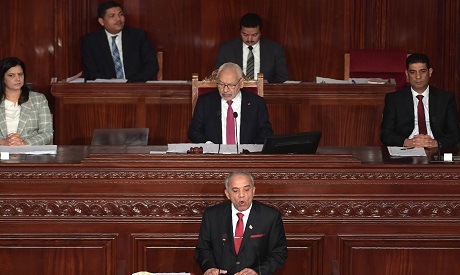
Tunisia's Prime Minister-designate Habib Jemli (below) addresses parliamentarians during a plenary session in the capital Tunis, on January 10, 2020, for a confidence vote on his proposed cabinet line-up. (AFP)
Tunisia's parliament looked poised to reject a proposed new government on Friday after only one party said it would support it in a vote of confidence, meaning a complex coalition-building process may need to start again.
Designated prime minister Habib Jemli urged parliament to support his proposed cabinet as the debate began on Friday morning, before a vote expected later in the day.
However, the only party in the deeply fragmented parliament to say it will back his government is the moderate Islamist Ennahda, which nominated Jemli as prime minister after coming first in the Oct. 6 election with 53 of the 217 seats.
The parties that have already said they will vote against it have a combined 120 seats, so Jemli would need to peel off some of their MPs as well as winning over all independents to secure the 109 seats needed for majority support.
If Jemli loses the confidence vote, President Kais Saied, who was also elected in October, can ask somebody else to try to build a coalition able to command a majority in parliament.
Even if he manages to win the confidence vote, however, it would likely be by so small a margin that his government would be very fragile, with little chance of passing painful economic reforms that analysts say are needed.
Youssef Chahed, who has served as prime minister since 2016, and was a losing candidate in the presidential election, will continue as acting premier until a new government is appointed.
If Saied's own candidate for prime minister was also unable to form a government that could win a confidence vote, he would call another election.
Friday's vote looked likely to be the first since Tunisia's 2011 democratic revolution in which a parliament has rejected a new government, and would also represent a setback for Ennahda.
The party has been the most consistently powerful force in Tunisian politics since the revolution, playing a major part in successive governments and coming first in several elections.
However, while it emerged as the biggest party in the October election, its vote share and number of seats declined, and its efforts to bring together political rivals behind Jemli now also appear doomed.
Short link: